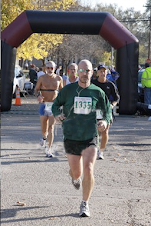Life can sure change your training habits. When I graduated from college and began gearing up for my first half marathon, I had no other concerns besides my running and my job. I wasn’t married. I had no kids, no pets, an apartment where I didn’t have to do the maintenance. Nothing. So I ran—six days a week, religiously, for about four months. I was up to 70 miles a week or so. My “short” runs were six-milers. I ran six-and-a-half-minute miles. Consistently.
And I regularly trained for more than I was going to run on race day. Weekends were 18- or 19-milers. I’d be on the roads and trails for hours.
When I ran my first half-marathon, I thought I did pretty well. In a field of nearly 16,000, I finished in the top 1,000. My time was 1:35. I was happy.
So I did it all again the next year.
I trained harder. I put in more miles. I lost more weight. And when I ran, I performed even better. I beat my previous time by more than two minutes. I placed even higher.
Then I got married. Then my wife told me she was pregnant. Then we bought a house. Then we had another child. Then we moved to a different house. Subsequently, those endless days on the road changed.
Don’t get me wrong, my life is so much richer than it was in those early days. But it’s different. Running, which used to play such a prominent role in my life—it defined me in many ways—took a back seat to other priorities. I still ran, but not as far. I ate more and exercised less. I gained weight. I was more tired. I had other obligations. I couldn’t just leave the house at the drop of a hat to go run for an hour or more.
That third year, I skipped the half-marathon. (My son was due right around race day and my wife didn’t want to go into labor while I was lost somewhere six miles into a sea of other runners, unable to be reached. She didn’t deliver on that day, by the way, but it was close). But the next year I vowed to run it again.
I trained, but my training wasn’t nearly as intense as it had been. Instead of running six days a week, I ran three or four. Instead of 70 miles per week, I ran 20. Instead of a 6:30 pace, I ran 8:30. Instead of 18-mile runs, I ran, maybe, 10-milers.
And I suffered. It’s amazing how fast it all goes away. When once I was an up-and-comer, I quickly became a middle-of-the-packer. I ran the half-marathon that year in about two hours.
What’s weird is I wasn’t disappointed in my results. What’s even weirder is I started to love running even more. My feelings are different now, though. When once I harbored pipe dreams of winning races, of getting faster and faster until I could keep up with the elite runners at the front of the pack, I have now resigned myself to the reality that I probably will never win, that I will never again be in the same shape I was when I was in my 20s, that I will never again run consistent seven-minute miles.
I’m okay with that.
Because while I don’t run as many miles as I used to, I think I’m a better person. Running is part of me still, but it doesn’t define me as it once did. When I was young, I wanted to get faster. I was disappointed if I didn’t run subsequent races in better times. Now, that type of success doesn’t matter so much. What’s taken its place? My family. My health. My happiness. Running makes me feel better. It makes me a better person. Running is the time I give myself so I can give more of my time to others later.
Life changes your training habits. I believe in that. But you can choose to live to train, or you can choose to train to live. You either work hard at your life, or you let it pass you by. Running is still an important part of my life, but now it’s only one part of it. I have other things in my life that are important, too.
My life is fuller because of that. I hope yours is, too.
Thanks for reading, and happy running.
First Cousin
2 months ago


No comments:
Post a Comment